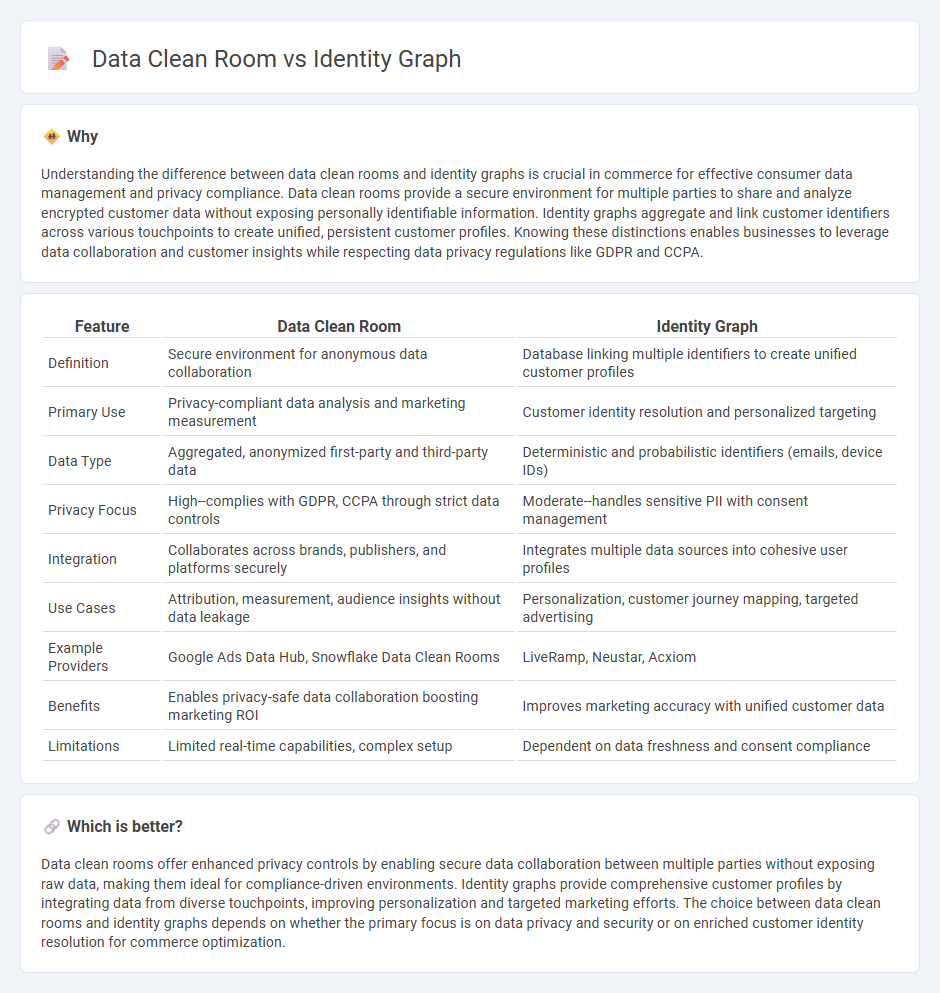
Data clean rooms ensure secure, privacy-compliant collaboration by allowing brands and partners to analyze combined datasets without exposing raw data, enhancing targeted marketing precision. Identity graphs consolidate disparate consumer identifiers across multiple channels into unified profiles, enabling comprehensive customer insights and personalized experiences. Explore the distinctions and applications of data clean rooms versus identity graphs to optimize your commerce strategies.
Why it is important
Understanding the difference between data clean rooms and identity graphs is crucial in commerce for effective consumer data management and privacy compliance. Data clean rooms provide a secure environment for multiple parties to share and analyze encrypted customer data without exposing personally identifiable information. Identity graphs aggregate and link customer identifiers across various touchpoints to create unified, persistent customer profiles. Knowing these distinctions enables businesses to leverage data collaboration and customer insights while respecting data privacy regulations like GDPR and CCPA.
Comparison Table
| Feature | Data Clean Room | Identity Graph |
|---|---|---|
| Definition | Secure environment for anonymous data collaboration | Database linking multiple identifiers to create unified customer profiles |
| Primary Use | Privacy-compliant data analysis and marketing measurement | Customer identity resolution and personalized targeting |
| Data Type | Aggregated, anonymized first-party and third-party data | Deterministic and probabilistic identifiers (emails, device IDs) |
| Privacy Focus | High--complies with GDPR, CCPA through strict data controls | Moderate--handles sensitive PII with consent management |
| Integration | Collaborates across brands, publishers, and platforms securely | Integrates multiple data sources into cohesive user profiles |
| Use Cases | Attribution, measurement, audience insights without data leakage | Personalization, customer journey mapping, targeted advertising |
| Example Providers | Google Ads Data Hub, Snowflake Data Clean Rooms | LiveRamp, Neustar, Acxiom |
| Benefits | Enables privacy-safe data collaboration boosting marketing ROI | Improves marketing accuracy with unified customer data |
| Limitations | Limited real-time capabilities, complex setup | Dependent on data freshness and consent compliance |
Which is better?
Data clean rooms offer enhanced privacy controls by enabling secure data collaboration between multiple parties without exposing raw data, making them ideal for compliance-driven environments. Identity graphs provide comprehensive customer profiles by integrating data from diverse touchpoints, improving personalization and targeted marketing efforts. The choice between data clean rooms and identity graphs depends on whether the primary focus is on data privacy and security or on enriched customer identity resolution for commerce optimization.
Connection
Data clean rooms and identity graphs are interconnected tools in commerce that enhance customer data privacy while enabling precise audience targeting. Data clean rooms aggregate and anonymize data from multiple sources, allowing brands to analyze consumer behavior without compromising individual privacy. Identity graphs link diverse customer identifiers across channels, feeding unified profiles into data clean rooms to improve segmentation and personalized marketing strategies.
Key Terms
Data Integration
An identity graph consolidates user identifiers across multiple platforms to create a unified customer profile, enhancing personalized marketing and targeting through precise data integration. Data clean rooms enable secure collaboration between companies by allowing aggregated and anonymized data analysis without direct data sharing, ensuring privacy compliance while integrating data from diverse sources. Explore more to understand how these solutions optimize data integration strategies for robust customer insights.
Privacy
Identity graphs aggregate user data from multiple sources to create unified consumer profiles, enabling personalized marketing while maintaining anonymity through pseudonymization and encryption techniques. Data clean rooms provide a secure environment where multiple parties can analyze aggregated data collaboratively without exposing personally identifiable information (PII), ensuring strict compliance with privacy regulations like GDPR and CCPA. Explore how leveraging identity graphs and data clean rooms can elevate your privacy-first marketing strategy.
Attribution
An identity graph integrates data from multiple sources to create a unified consumer profile, enabling precise attribution by linking user interactions across devices and channels. Data clean rooms offer a privacy-safe environment where aggregated, anonymized data can be analyzed collaboratively, ensuring attribution models comply with data privacy regulations without exposing individual user identities. Explore how leveraging both technologies can enhance attribution accuracy while maintaining compliance with privacy standards.
Source and External Links
What is an Identity Graph? | Hightouch - An identity graph is a database table that links unique customer identifiers and events to create a single user profile, enabling real-time updated and accurate views of customers for personalized use cases.
Identity graphs explained | GrowthLoop University - An identity graph compiles all personal and behavioral customer data into a unified profile using data from varied sources, consolidating it by identity resolution methods and updating it over time in the cloud.
Identity Graphs on AWS - Amazon Neptune - Identity graphs provide a single unified view across multiple devices and identifiers for real-time personalization and advertising targeting, supporting customer journey analysis, segmentation, and privacy compliance.
 dowidth.com
dowidth.com